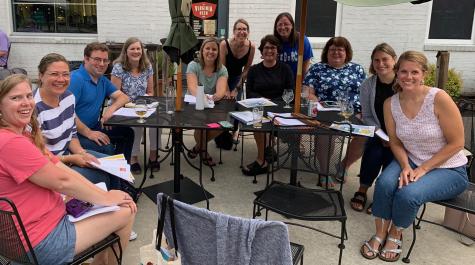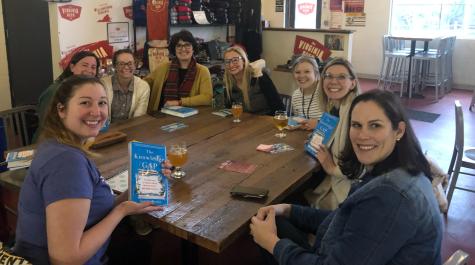Literacy Lab Offers Summer Intensive on Reading Instruction
This summer, the William & Mary Literacy Lab asked adjunct faculty member Ellen Frackelton M.Ed. ’19 to facilitate a professional development intensive for area teachers on teaching phonics. Over 70 teachers spanning eight divisions signed up for this professional development opportunity, which involved four virtual sessions in July and a face-to-face meeting in August. Sessions included building foundational and pedagogical knowledge alongside practical tips for classroom teaching, management and organization.
A particularly valuable facet of the summer intensive was that for two of the sessions, participants had the opportunity to observe Frackelton teaching a local child. After watching the instruction in action, participants then broke into groups to reflect on what they saw and ask clarifying questions. Feedback was overwhelmingly positive.
“Being able to watch Ellen teach a student live helped me understand and see how to explicitly teach each section in the phonics lesson. This opportunity to watch her teach also allowed me to see how she gave the student specific and corrective feedback,” noted Allie Cobb, a local teacher with Williamsburg-James City County Schools. “It’s so rare as teachers that we have the opportunity to watch others in action.”
The high turnout of teachers for this event, who voluntarily participated in the training during their summer vacation, speaks to how much reading instruction is currently top-of-mind for educators. Over 35 states have passed recent legislation about literacy instruction, mandating that it aligns with the “science of reading,” an approach to reading instruction that incorporates research from education, psychology, linguistics and neuroscience. The Commonwealth of Virginia has passed bills about instruction at both the K-3 and the 4-8 levels, with considerable changes to curriculum and assessments required by the fall of 2024.
“With the passage of the Virginia Literacy Act (VLA) there has been an increased focus on the importance of explicit, systematic instruction in foundational literacy skills. This is something that the majority of Virginia’s teachers were not prepared for in their pre-service certification programs or continued professional learning,” Frackelton notes. “The UFLI [University of Florida Literary Institute] Foundations book study from the Literacy Lab supported teachers’ professional learning and the implementation of resources with students. The goal was to support teachers’ knowledge while building effective instructional practices that they could use directly with students. This will support teachers in meeting the demands of the VLA.”
The high turnout of teachers also speaks to the indispensable role that the School of Education’s Literacy Lab has played in the last few years. This effort is just one example of the professional development opportunities the Literacy Lab provides. Literacy Lab co-coordinators Debbie Ramer and Kristin Conradi Smith, alongside the William & Mary School-University Resource Network, organized and hosted two conferences last year on the Science of Teaching Reading, with over 500 teachers and school leaders attending. Additionally, the Literacy Lab has provided professional development training to partner schools and hosts a monthly meeting for teachers where they discuss reading research and practices.
“Literacy is a key equity issue of our time, and one of the central missions of the Literacy Lab is that we support our teachers in their endeavors,” said Conradi Smith. “In an effort to understand the science of reading, we examine the research directly. We read studies and articles each month, and our meetings offer opportunities for collaboration, reflection and action. It’s an overwhelming time to be a teacher right now, especially a teacher of reading.”

